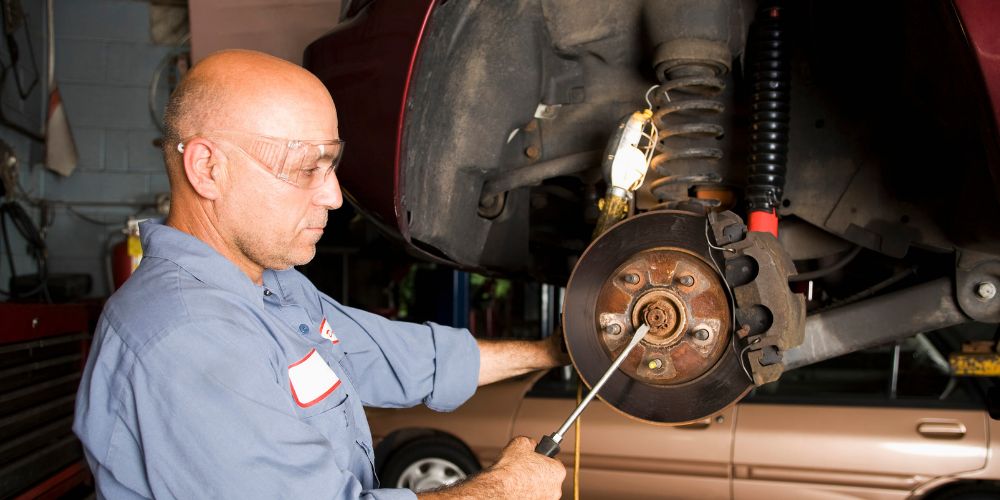Similar to tires, another important safety component on your vehicle wears out too; your brakes and brake rotors. These components absorb a tremendous amount of friction whenever a vehicle is brought to a stop. But how do we know when? Brake life varies greatly depending on driving behavior, how far we drive and the type of brake system we have. There are several key indicators for brake wear; below are some tips to help you diagnose various issues with your braking system.
What to Look (Or Listen) For…
Before we turn our attention to pads, rotors, and calipers let’s take a look at the brake fluid. A tell tale sign you might need to inspect your brake fluid, or the brake fluid line, is the lack of resistance from your brake pedal. A brake pedal shouldn’t have to be pressed to the floor of your vehicle and may be a major red flag.
Instead of trying to remember how things used to be, so let’s put our five senses to work.
Listen for the common noises of worn brake pads:
- A high-pitched squeal when not braking is usually the brake pad wear indicator or “squealer” hitting the rotor. This is a small tab of metal that is meant to scrape the rotor indicating it’s time to replace your brake pads.
- A squeaking sound, which happens when you apply the brakes. This squeak is usually an indication that the brake pads may not been installed properly, causing them to move around and make noise.
- A grinding sound when applying the brakes means your brake pad is completely worn out and the pad mounting surface is grinding into the rotor. At this point, the brakes need immediate attention.
Look for indications of worn brakes:
- Many newer cars have a dash light that comes on when the brake pads need to be replaced.
- In addition, on some cars you can look through the wheels and see the amount of brake pad remaining.
Feel anything different? Look for these signs, which may point to what needs to be replaced:
- Brakes pulsate when applied, meaning that the pedal bounces up and down. This may be a sign that your rotors are warped and need to be replaced.
- Vehicle pulls to the right or left when the brakes are applied; this could mean that your tires are out of balance or that you may be due for a wheel alignment.
- The brakes are “dragging” or not letting go when the pedal is released, that’s yet another reason why the brakes will need to be examined.
- Most importantly, if the pedal feels soft or spongy, or if it hits the floor with minimal resistance, then a trip to the garage needs to be planned immediately.
So What Do I Really Need?
Much of what you will need to repair the brakes depends on how worn the components have become and the overall age of the car.
- Brake Pads: You usually need to replace your brake pads when the pad has approximately 1 to 2 millimeters of friction material remaining.
- Rotors: Rotors need to be replaced if there is any indication of overheating, dramatic rusting, or any uneven surface that may cause the brakes to pulsate. A clean rotor surface – either by installing a new rotor or machining the old one – gives a nice mating surface for the new pad, and will guarantee full braking efficiency. Often times new rotors are more cost effective than turning the old rotors, although the quality of this new rotor should always be equivalent to the original equipment installed at the factory. In some cases, these new, cheaper rotors are made with lower quality materials and will not dissipate heat as well, leading to less effective braking and less life from the brake pads.
- Hydraulics: First, and most commonly, any failure in these components need to be addressed, which means if the caliper is leaking, or if any part does not move as designed and cannot be freed up and lubricated, then replacement is required. Replacement in pairs, with the caliper or cylinder on the opposite side, especially as the car ages, is usually wise. This will provide more balanced braking. They can also be replaced when the car reaches between 80,000 and 100,000 miles. Though the upfront costs may be expensive, this will prevent any problems from arising at the wrong time, and could prevent a tow and a more expensive bill in the future.
Stay On Top Of It
The more you know about the condition of your brakes, the more you can plan for the replacement of the right parts. If you are unsure of what to look for, or just don’t want the responsibility, have the brakes looked at when you head to the shop for regular maintenance, such as an oil change or tire rotation. Most shops will look at the brakes for free, and give you an idea of how much time or mileage may be left. The sooner you address brakes that are worn, usually the less money you will spend, and the less likely the chance the car ends up on the side of the road.
Is it time for you to replace your brakes? Find a great mechanic near you. Compare pricing before going to the shop, and book online!

